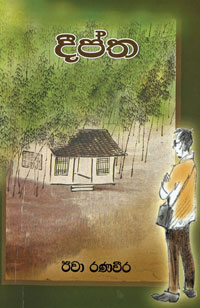|
Focus on Books:
Topic for contemporary Sinhala literary debate
Prof. Sunanda MAHENDRA
******
Title: Deeptha
Publisher:
Kantha Handa, 2008
Page count: 186
*********
Eva Ranaweera, the veteran journalist normally encompasses a feminine
experience in her creative works, inclusive of poetry, short stories and
novels.
To her credit some of her short novels called Laisa and Sedona have
carved a special place of herself as sensitive expositions on the
tortures and hardships in the lives of local women, unseen from the
point of view of some other creative writers at home.

I have always felt that her creative works have not been intensively
interpreted or critically evaluated by any scholar. As such she as a
writer remains to be discovered. But I would not pass a mere judgment on
the so called tele adaptation based on her novels and rush into a
conclusion.
The subtlety of her original creations I presume is somewhat lost or
absent in tele creations. May that be left apart I consider the present
work Deeptha, a name given to the protagonist of the work, who poses as
a young journalist who begins his career as a parliament cub reporter
and an investigative reporter of a special calibre.
It is observed as partly the inner exposition of this journalist that
cover the gamut of experience that lay buried in the contents.
But the narrative style and rhythm of expression is quite
unconventional. The writer Ranaweera does not attempt to present a
series of upheavals in the life of this young journalists in a
chronological order. Instead she attempts to present an extended view
via the literary mode of expression through a stream of consciousness,
where the inner feelings of Deeptha are uncovered to the upper crust of
expression.
This expression in itself is the exposure of what had occurred in the
life of a young journalist who had forced a series of mysterious or you
may all, eccentric events for what an answer or a solution is
anticipated. The reader encounters the forgetfulness and strains in the
life of Deeptha initially due to his moods of fantasy enveloped in a
romantic episode with a racially different female journalist. Hasina,
who too is pictured as a tragic character. Then in snapshot like series
of short episodes, the trials and tribulations in the career of Deeptha
are recorded in situational forms which encircle a wider gamut of human
experiences, while living abroad.
They include events such as the difficulty to obtain visa to live
abroad, the hunting or digging out of scoops for a local newspaper, the
tragic deaths and sicknesses of nearer and clearer relatives failure to
grasp some of the social happenings and eventual shortcomings, etc.
The main duty as recorded by the writer Ranaweera as entrusted to
Deeptha, her protagonist is to subject 'scoops' a journalistic term that
denotes and exclusive piece of investigative reporting of an unusual
event to the newspaper. But what Deeptha regards as a scoop may not be
seen from the right perspective from the point of view of the local
editor at home. The local editor responsible to receive the scoops is
one Peramune, portrayed as an understanding senior journalist.
But it seems that the so called scoops on the part of Deeptha itself,
creates a backfire effect on him. The life led by Deeptha himself looks
like a tragic episode. He is portrayed as an investigative reporter
Sandwiched between two main forces, the ethics rules, and by laws
guiding his profession while living abroad, in this instance Cairo. Then
comes his own domestic life crowded by his own sensitivities.
The character of Deeptha, to my mind, is portrayed as a lightly
mentally confused, more inclined to creativity than granting of the
reality around him. As such he is also nicknamed as 'Kalka' by some
others. In fact nothing round or trick ending happening in this work,
instead throws several bright insights to the human behaviour of
abnormality.
Ranaweera as her creative technique of communication includes thought
streams in the the form of a brief, free verses, thought streams, and
imaginary. The narrative as I stated is unconventional. But it is not
that factor that makes the work commendable. It is the inner layer
devoid of a rounded plot line that matters. This novel I presume should
be a good subject for the contemporary Sinhala literary debate on
creative works and criticisms. |





